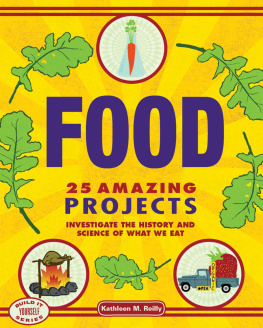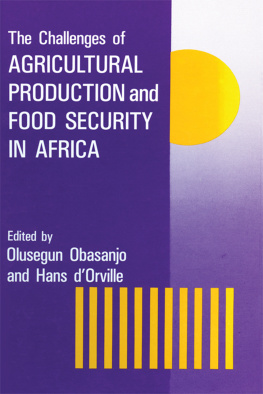
Food Security for Rural Africa
At least fifty years of projects aimed at the rural poor in Africa have had very little impact. Up to half of the children of these countries are still suffering from stunting and malnutrition. Soil degradation and poor crop yields are ubiquitous. Projects are almost always aimed at helping local people to solve their problems by growing for the market. In some countries, projects link poor villagers into cooperatives to produce a commercial output. In other countries, projects target more competent entrepreneurial villagers. Almost all these projects fail after several years. Even those that are successful make few inroads into the problems.
While the slogan feeding the farmers first comes from the Philippines, it is particularly applicable to much of Africa, where household food security can come from household production. This book explains how projects can be designed that increase food security through subsistence production. Focusing on particular people and projects, it gives a sociological analysis of why this is so difficult to manage. This book challenges the models promoted by academics in the field of development studies and argues against the strategies adopted by most donor organizations and government bodies. It explains why commercial projects have been so ubiquitous even though they rarely work. It gives practical tips on how to set up villages and farms to achieve sustainable solutions that also provide plenty of nutritious food. The book is written to be accessible and engaging. For anyone planning to work in the rural areas of Africa, this book is required reading.
Terry Leahy is Conjoint Senior Lecturer in the School of Humanities and Social Science at Newcastle University, Australia.
Routledge Contemporary Africa Series
The Development of African Capital Markets
A Legal and Institutional Approach
Boniface Chimpango
China, Africa and Responsible International Engagement
Yanzhuo Xu
Joke-Performance in Africa
Mode, Media and Meaning
Edited by Ignatius Chukwumah
The Media and Aid in Sub-Saharan Africa
Whose News?
Lena von Naso
Political Culture, Change, and Security Policy in Nigeria
Kalu N. Kalu
African Science Education
Gendering Indigenous Knowledge in Nigeria
Jamaine Abidogun
Power in Contemporary Zimbabwe
Edited by Erasmus Masitera and Fortune Sibanda
Unfolding Narratives of Ubuntu in Southern Africa
Edited by Julian Mller, John Eliastam and Sheila Trahar
Reimagining Science and Statecraft in Postcolonial Kenya
Stories from an African Scientist
Denielle Elliott with Davy Kiprotich Koech
Food Security for Rural Africa
Feeding the Farmers First
Terry Leahy
Food Security for Rural Africa
Feeding the Farmers First
Terry Leahy
First published 2019
by Routledge
2 Park Square, Milton Park, Abingdon, Oxon OX14 4RN
and by Routledge
711 Third Avenue, New York, NY 10017
Routledge is an imprint of the Taylor & Francis Group, an informa business
2019 Terry Leahy
The right of Terry Leahy to be identified as author of this work has been asserted by him in accordance with sections 77 and 78 of the Copyright, Designs and Patents Act 1988.
All rights reserved. No part of this book may be reprinted or reproduced or utilised in any form or by any electronic, mechanical, or other means, now known or hereafter invented, including photocopying and recording, or in any information storage or retrieval system, without permission in writing from the publishers.
Trademark notice: Product or corporate names may be trademarks or registered trademarks, and are used only for identification and explanation without intent to infringe.
British Library Cataloguing-in-Publication Data
A catalogue record for this book is available from the British Library
Library of Congress Cataloging-in-Publication Data
Names: Leahy, Terry (Sociologist), author.
Title: Food security for rural Africa : feeding the farmers first / Terry Leahy.
Other titles: Routledge contemporary Africa series ; 10.
Description: Feeding the farmers first | Series: Routledge contemporary Africa series ; 10
Identifiers: LCCN 2018020317 | ISBN 9780815354062 (hardback) | ISBN 9781351134156 (ebook) | ISBN 9781351134125 (mobipocket)
Subjects: LCSH: Food securityAfrica, Sub-Saharan. | Food supplyAfrica, Sub-Saharan. | AgricultureEconomic aspectsAfrica, Sub-Saharan. | Africa, Sub-SaharanRural conditions.
Classification: LCC HD9017.A3572 L43 2018 | DDC 338.1967dc23
LC record available at https://lccn.loc.gov/2018020317
ISBN: 978-0-8153-5406-2 (hbk)
ISBN: 978-1-351-13415-6 (ebk)
Typeset in Times New Roman
by Wearset Ltd, Boldon, Tyne and Wear
Contents
Illustrations
Figures
Tables
Preface and acknowledgements
Over the last fifteen years, my academic work and my field trips to Africa have focused on food security projects. In 2003 I was convenor of the Masters of Social Change and Development degree at Newcastle University in Australia. We had a particularly active international officer, David Wise, who was keen to recruit students from many countries in Africa. He shared with our dean Terry Lovat the view that the rich countries had a responsibility to give assistance to the developing world, through projects that were practical and could build capacity at the local level. At that time the Australian government was running a programme of liaison with South Africa to help that country to establish LandCare in South Africa. Landcare in Australia had been started by farmers. They had set up local associations to deal with land degradation and to promote sustainable agriculture. The Australian government had initiated a programme to help South Africa to set up a similar network through its agriculture departments. As part of that liaison, the Australian government was offering scholarships for agricultural officers from South Africa to come to Australia for postgraduate study. David Wise managed to recruit ten of these students to undertake the Masters of Social Change and Development at the University of Newcastle, as a first intake. In subsequent years, our programme recruited hundreds of international students from different parts of the world. African students were always a key part of that mix. Initially, the rural development projects of particular interest to the African agricultural officers were covered in a variety of ways. First through courses in project design, evaluation and research methodology. Along with these were courses that were open to student initiative, such as special projects and research projects. In these I started to teach the material on food security and rural development that was later to become a subject in our degree.
My students taught me a lot. As they developed their special projects we would meet to plan their research. I suggested reading and talked through the situations they had faced as agricultural officers. We worked out what they could do for their research and they went back in our summer break to do interviews and conduct participant observation. Their research was conducted in the rural areas where they had been working as agricultural officers. For the most part, the work they had been doing did not concern large commercial farms, usually owned by white people. Instead they had been attending to the farming enterprises of rural smallholders, black people who had been relocated into native reserves in the colonial period. Poverty in these rural villages was extreme. Cropping for household food supply was common, both in South Africa and the other African countries from which our students came. However, it was unfortunately very typical that this cropping did not provide an adequate diet. There were hungry periods and diets were short of many essential nutrients. Our research uncovered the statistics on all this stunting of children under 5 years old, nutrient deficiencies and unemployment.






